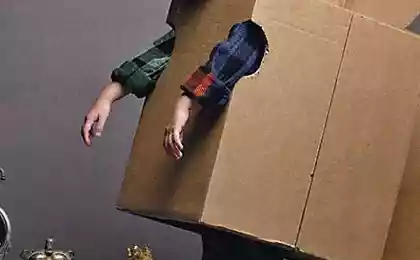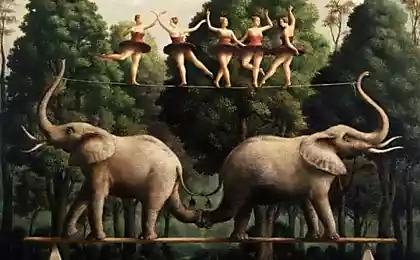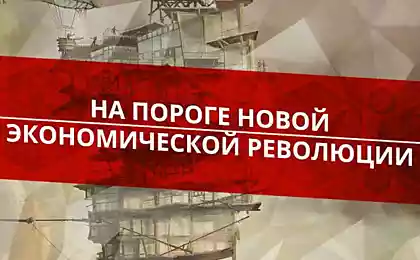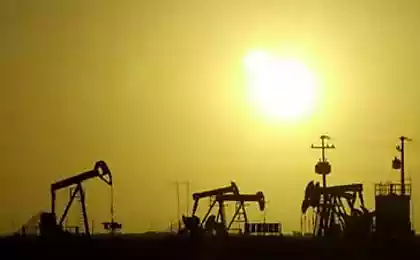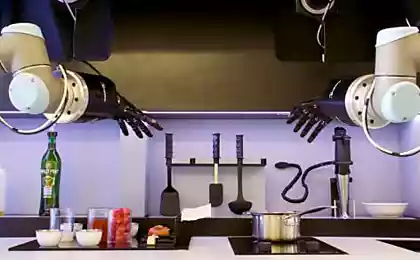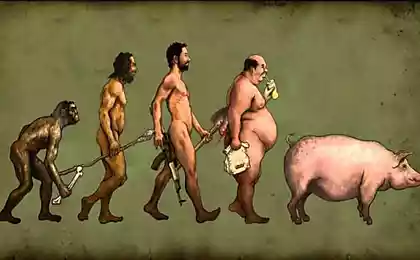1223
Robotics is one of the aspects of becoming a non-monetary economy
Economic development throughout human history to make an important contribution to the progress of civilization. Economy and today continues to play a dominant role in the competitive social development, both at the international level and within each country. But by the well-known problem slowdown futurists have added another: in their forecasts, in 15 years robots could equal and even surpass men intelligence. What could be the economy in the near future? What will happen with the new community of humans and robots: war or peace?
Once thought about robots, firmly entered our lives, breathtaking and promised unimaginable accomplishments. "Forgotten chores, stopped running." We Grez brave new world in which robots are faithful servants, and people enjoying the fruits of his scientific achievements. Thus, in the 1970-1980's robotics was associated with many hopes. While the triumph of machine over man seemed real at least in the production process. Industry predicted the future based on electronically controlled machine tools, robots and other lines wonders of human thought. However, the victory over the revolutionary technology won "Chinese with a screwdriver".
1970 was very challenging for world capitalism. Has risen in price, not only oil, but also many other products. Capital of North America, Europe and Japan wanted to increase profitability, rather than tax increases and expansion of social services. And the neoliberal economic model bailed free manpower in the periphery. Capital markets were able to find a cheap and vulnerable labor force, rushed from the North to the South, and in most industries had to forget about robots.
The energy of human muscle was much cheaper than the power for the new machines, the introduction of which has taken limited. Industry, except for the production of computers, phones and other electronic devices, entered the era of thirty years of stagnation. Vehicles and industries changed little. But now that era coming to an end.
Before the 2008 crisis talk about the imminent triumph of robotics is most often worn groundless. "Serious economists' whenever upsets dreamers axioms like limbs excess oil and cheap labor. However, in 2008 the situation changed. Model of neoliberal capitalism got into a severe crisis. The abundance of the world economy and uneducated disenfranchised workers ceased to seem a solid foundation for economic growth. It became obvious that a cheap worker is no longer sufficient to reduce the cost of goods and at the same time can not consume as Europeans and Americans. The economy is necessary to support the demand, a new policy of its regulation and creation. And including for this work must be expensive: employees need to buy something made goods.
At the same time, one should not underestimate the fact that the introduction of efficient technologies could threaten the return on capital: some prices have fallen so much that their production in terms of growth of capital becomes unprofitable. Hence the actions of monopolies, slowing the economy: companies using monopoly power more and more extort rent from the capital. As a result, there is too much wealth and rising inequality. Revenues often go not to those who produce and those who own patents. A new class of people receiving rent technological
However, the question is not only that the classic term "unemployment" will begin to lose its value. Has not been a serious discussion of the problem of market competition in the context of mass robotics. According to Nobel Prize winner Paul Krugman and his colleagues Kenetta Rogoff, jobs will be even less than it is now, everyone will live on credit, and the world will be ruled by a few companies a monopoly with a small number of employees and a large number of robots
P. Krugman "sees signs of revolution robots and does not expect anything good from it." Cheap Asian labor force will become less and less in demand. Profits from the sale of goods will be given to those who own the capital needed for production. Capital turn into the only growth factor - in contrast to human labor, which has depreciated and no longer influence the growth, as its share in the economy (the share of wages in value of production) will steadily decline (Fig. 1).
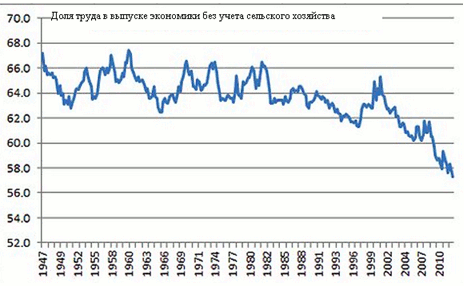
Figure 1. Reduction of the share of labor in industrial production
According to P. Krugman, everything is equally important that the employee is able to. Benefit received by the one who owns capital. And therefore, recognizes the Nobel laureate, Karl Marx's theory of the struggle between labor and capital becomes very real. In fact, the concentration of capital contributes to strengthening monopolies. Monopoly invested in new technologies that contribute to an increase in capital. The circle closes.
Thus, the traditional recommendation - retraining of personnel, the opening of new production facilities, where there is little use of robots effectively stimulate labor migration within the country and abroad, and others. - In a changing environment, more and more different from today, will fire worse. Because replacing a competitive, market relations people inevitably comes the logic of interacting robots.
The emergence of new machines is not in itself change society. Robots can provide an abundance of low-cost and higher-quality goods, and maybe even help to orient their production on individual request.
However, without social conflicts can not do. Goods need to consumers, and in the conditions of a revolution in robotics and energy many old profession will be under tremendous blow. Without addressing the issue of stimulating demand and providing their work and livelihood can not do. The problem will not supply consumers with necessary goods, but rather how to ensure the mass of products sufficient number of consumers.
Therefore, one of the most important problems for the world economy will be employment policy. What will happen with the workers, the profession which will be unnecessary due to the automation of production and services? One will have to find a place in the social security system, the other - to learn. Over time, it will be difficult to get a cleaner, waiter or seller. From factory worker will need the ability to manage lines of robots rather than compete with them in speed operations.
But need a lot of jobs. Therefore, in the new conditions of their creation have to deal primarily state. The driving force of employment can - at least for a while - to become government and social sectors. Provisions have. The school will start a movement from the factory type of training to individual or group mentoring, and thus the need for physicians, researchers, teachers and educators will be enormous. Many jobs will be created in the spectrum of "man to man". And perhaps many ruining his time in office routine people will go to work in science, which will be given priority in the eyes of society.
"If your work is not associated with creative thinking, analytical thinking, as well as relationships with other people, and you work in an office or in the service sector, you are at risk," - said Professor Ed Hess, noting that, to the best of his According robots replace humans about 66 percent of jobs in the US.
Most likely, you will need a reduction of the working week. To support the economy will require more than the average worker developed, as well as more jobs. Businesses may have for new laws to hire more workers, and not to overload the small staff. Due to this, the workers themselves will have time to develop, leisure and consumption. And it will not be the first time in history when scientific and technological progress will generate a reduction of the working week (though without the class struggle is nothing never happened).
It is even possible for the sake of stable employment state will have to go on raising the retirement age to reduce it. Although the idea of retirement for people engaged in creative and interesting work, it will seem strange.
One of the directions out of the situation can lead nemonitarnoy model of the economy, its main thesis is as follows:
1. Meeting the needs of the entire population.
Achieved by increasing the volume of production by attracting the majority of people and equipment in promyshlennny and the agricultural sector, involving science and technology, the introduction of new technologies and innovative programs. All this is possible only after the abolition of the monetary system.
2. Equitable distribution of the products of labor.
Achievable, provided that the cancellation of the monetary system, the abolition of capitalist institutions, the introduction of the institution of public property, the introduction of measures for the use of resources and products production.
3. Computer-aided manufacturing and agriculture.
Achievable, after the abolition of the monetary system, creating a long-term program of resuscitation and modernization of strategic industrial enterprises, introduction of new technologies such as cybernetic, including information and scheduling production modules.
4. Reduction of the working day.
Achieved after the abolition of the monetary system, the translation of the entire population of the trading in the sector in the production and then after serial production automation and innovation.
5. Getting rid of manual labor.
Achieved only after the abolition of the monetary system. For profit leverage cheap labor.
6. Increase of free time each person.
Achieved after engaging in the production of most of the population, and the modernization of productions.
Principles thicker help in the development of non-monetary economic model in a society can be summarized as follows. The need for products that are produced in countries that do not use non-monetary economic Madeleine can be covered by the sale of these countries for money products and the subsequent purchase their desired products. Quality of work per day shall be noted if the job does not match the "standard" for a certain period of time, then the person should be removed from the system for some time. Quality of work should be determined without human intervention.
In a non-monetary economy system of employment, labor and stimulating will have a complete database of all workers in the country and to have information about where there is the rise of production and improve product quality. Conscious workers will move to the governing bodies, poor performers translated into more primitive places. Poor worker will oblige improve their qualifications and trained. The Company will be interested in the fact that all people understand and make sense of their work and responsibilities. In the initial stages of economic development in special cases, the society will create special gifts for the best workers and deprive poor worker some material benefits. However, the main goal of the company is still free production of the human factor to the work performed by the machine. Working day in human non-monetary economy will decrease in the first year for an hour due to the transfer of the total working population in the industrial sector, and every year the day will decrease and labor optimized so that the best results are achieved with the lowest labor costs.
Source: geektimes.ru/post/240458/
Once thought about robots, firmly entered our lives, breathtaking and promised unimaginable accomplishments. "Forgotten chores, stopped running." We Grez brave new world in which robots are faithful servants, and people enjoying the fruits of his scientific achievements. Thus, in the 1970-1980's robotics was associated with many hopes. While the triumph of machine over man seemed real at least in the production process. Industry predicted the future based on electronically controlled machine tools, robots and other lines wonders of human thought. However, the victory over the revolutionary technology won "Chinese with a screwdriver".
1970 was very challenging for world capitalism. Has risen in price, not only oil, but also many other products. Capital of North America, Europe and Japan wanted to increase profitability, rather than tax increases and expansion of social services. And the neoliberal economic model bailed free manpower in the periphery. Capital markets were able to find a cheap and vulnerable labor force, rushed from the North to the South, and in most industries had to forget about robots.
The energy of human muscle was much cheaper than the power for the new machines, the introduction of which has taken limited. Industry, except for the production of computers, phones and other electronic devices, entered the era of thirty years of stagnation. Vehicles and industries changed little. But now that era coming to an end.
Before the 2008 crisis talk about the imminent triumph of robotics is most often worn groundless. "Serious economists' whenever upsets dreamers axioms like limbs excess oil and cheap labor. However, in 2008 the situation changed. Model of neoliberal capitalism got into a severe crisis. The abundance of the world economy and uneducated disenfranchised workers ceased to seem a solid foundation for economic growth. It became obvious that a cheap worker is no longer sufficient to reduce the cost of goods and at the same time can not consume as Europeans and Americans. The economy is necessary to support the demand, a new policy of its regulation and creation. And including for this work must be expensive: employees need to buy something made goods.
At the same time, one should not underestimate the fact that the introduction of efficient technologies could threaten the return on capital: some prices have fallen so much that their production in terms of growth of capital becomes unprofitable. Hence the actions of monopolies, slowing the economy: companies using monopoly power more and more extort rent from the capital. As a result, there is too much wealth and rising inequality. Revenues often go not to those who produce and those who own patents. A new class of people receiving rent technological
However, the question is not only that the classic term "unemployment" will begin to lose its value. Has not been a serious discussion of the problem of market competition in the context of mass robotics. According to Nobel Prize winner Paul Krugman and his colleagues Kenetta Rogoff, jobs will be even less than it is now, everyone will live on credit, and the world will be ruled by a few companies a monopoly with a small number of employees and a large number of robots
P. Krugman "sees signs of revolution robots and does not expect anything good from it." Cheap Asian labor force will become less and less in demand. Profits from the sale of goods will be given to those who own the capital needed for production. Capital turn into the only growth factor - in contrast to human labor, which has depreciated and no longer influence the growth, as its share in the economy (the share of wages in value of production) will steadily decline (Fig. 1).

Figure 1. Reduction of the share of labor in industrial production
According to P. Krugman, everything is equally important that the employee is able to. Benefit received by the one who owns capital. And therefore, recognizes the Nobel laureate, Karl Marx's theory of the struggle between labor and capital becomes very real. In fact, the concentration of capital contributes to strengthening monopolies. Monopoly invested in new technologies that contribute to an increase in capital. The circle closes.
Thus, the traditional recommendation - retraining of personnel, the opening of new production facilities, where there is little use of robots effectively stimulate labor migration within the country and abroad, and others. - In a changing environment, more and more different from today, will fire worse. Because replacing a competitive, market relations people inevitably comes the logic of interacting robots.
The emergence of new machines is not in itself change society. Robots can provide an abundance of low-cost and higher-quality goods, and maybe even help to orient their production on individual request.
However, without social conflicts can not do. Goods need to consumers, and in the conditions of a revolution in robotics and energy many old profession will be under tremendous blow. Without addressing the issue of stimulating demand and providing their work and livelihood can not do. The problem will not supply consumers with necessary goods, but rather how to ensure the mass of products sufficient number of consumers.
Therefore, one of the most important problems for the world economy will be employment policy. What will happen with the workers, the profession which will be unnecessary due to the automation of production and services? One will have to find a place in the social security system, the other - to learn. Over time, it will be difficult to get a cleaner, waiter or seller. From factory worker will need the ability to manage lines of robots rather than compete with them in speed operations.
But need a lot of jobs. Therefore, in the new conditions of their creation have to deal primarily state. The driving force of employment can - at least for a while - to become government and social sectors. Provisions have. The school will start a movement from the factory type of training to individual or group mentoring, and thus the need for physicians, researchers, teachers and educators will be enormous. Many jobs will be created in the spectrum of "man to man". And perhaps many ruining his time in office routine people will go to work in science, which will be given priority in the eyes of society.
"If your work is not associated with creative thinking, analytical thinking, as well as relationships with other people, and you work in an office or in the service sector, you are at risk," - said Professor Ed Hess, noting that, to the best of his According robots replace humans about 66 percent of jobs in the US.
Most likely, you will need a reduction of the working week. To support the economy will require more than the average worker developed, as well as more jobs. Businesses may have for new laws to hire more workers, and not to overload the small staff. Due to this, the workers themselves will have time to develop, leisure and consumption. And it will not be the first time in history when scientific and technological progress will generate a reduction of the working week (though without the class struggle is nothing never happened).
It is even possible for the sake of stable employment state will have to go on raising the retirement age to reduce it. Although the idea of retirement for people engaged in creative and interesting work, it will seem strange.
One of the directions out of the situation can lead nemonitarnoy model of the economy, its main thesis is as follows:
1. Meeting the needs of the entire population.
Achieved by increasing the volume of production by attracting the majority of people and equipment in promyshlennny and the agricultural sector, involving science and technology, the introduction of new technologies and innovative programs. All this is possible only after the abolition of the monetary system.
2. Equitable distribution of the products of labor.
Achievable, provided that the cancellation of the monetary system, the abolition of capitalist institutions, the introduction of the institution of public property, the introduction of measures for the use of resources and products production.
3. Computer-aided manufacturing and agriculture.
Achievable, after the abolition of the monetary system, creating a long-term program of resuscitation and modernization of strategic industrial enterprises, introduction of new technologies such as cybernetic, including information and scheduling production modules.
4. Reduction of the working day.
Achieved after the abolition of the monetary system, the translation of the entire population of the trading in the sector in the production and then after serial production automation and innovation.
5. Getting rid of manual labor.
Achieved only after the abolition of the monetary system. For profit leverage cheap labor.
6. Increase of free time each person.
Achieved after engaging in the production of most of the population, and the modernization of productions.
Principles thicker help in the development of non-monetary economic model in a society can be summarized as follows. The need for products that are produced in countries that do not use non-monetary economic Madeleine can be covered by the sale of these countries for money products and the subsequent purchase their desired products. Quality of work per day shall be noted if the job does not match the "standard" for a certain period of time, then the person should be removed from the system for some time. Quality of work should be determined without human intervention.
In a non-monetary economy system of employment, labor and stimulating will have a complete database of all workers in the country and to have information about where there is the rise of production and improve product quality. Conscious workers will move to the governing bodies, poor performers translated into more primitive places. Poor worker will oblige improve their qualifications and trained. The Company will be interested in the fact that all people understand and make sense of their work and responsibilities. In the initial stages of economic development in special cases, the society will create special gifts for the best workers and deprive poor worker some material benefits. However, the main goal of the company is still free production of the human factor to the work performed by the machine. Working day in human non-monetary economy will decrease in the first year for an hour due to the transfer of the total working population in the industrial sector, and every year the day will decrease and labor optimized so that the best results are achieved with the lowest labor costs.
Source: geektimes.ru/post/240458/



